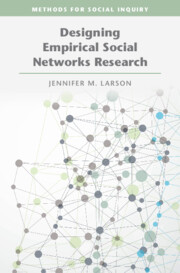Designing Empirical Social Networks Research
A user-friendly introductory guide to the empirical study of social networks. Jennifer M. Larson presents the fundamentals of social networks in an intuition-forward way which guides theory-driven research design. Substantial attention is devoted to a framework for developing a network theory that will steer data collection to be maximally informative and minimally frustrating. Other features include: Coverage of a range of practical topics including selecting operationalizations, cutting survey costs, and cleaning data; A tutorial for getting started in analyzing networks in R; Technical sections full of examples, points to hone intuition, and practice problems with solutions. Designing Empirical Social Networks Research will be a valuable tool for advanced undergraduates, Ph.D. students in the social sciences, especially political science, and researchers across the social sciences who are new to the study of networks.
- Provides a framework for constructing a network theory that will help researchers think through the preliminaries of their research in a principled way
- Introduces networks in an accessible intuition-forward way that does not require a strong background in maths
- Uses specific examples from political science, making it particularly relevant to the field
Reviews & endorsements
'This book delivers exactly what the title promises by providing clear, concise, step-by-step guidance for designing empirical social networks research. Larson introduces readers to the conceptual language necessary to theorize the role and nature of networks, and explains how to analyze networks empirically. The book will be an invaluable resource for social scientists interested in adding social networks research to their toolkit.' Imke Harbers, Associate Professor of Political Science, the University of Amsterdam
'Much has been written about the analysis of network data, but the field has lacked a comprehensive guide to the design of network research until now. Particularly important in Larson's book is the focus on developing a sound network theory and using that to guide the rest of the process, from data gathering and processing to analysis. With practical examples from an experienced field researcher throughout, this book is a definitive reference for those embarking on network research.' Skyler J. Cranmer, Carter Phillips and Sue Henry Professor and Director, Machine Intelligence and Data Science (MIDS) Laboratory, The Ohio State University
Product details
November 2024Paperback
9781009484220
186 pages
228 × 151 × 10 mm
0.27kg
Available
Table of Contents
- 1. Introduction to social networks research
- 2. Describing and interpreting social network features
- 3. Accounting for substantive network features
- 4. Crafting a network theory
- 5. Moving from theory to Empirics
- 6. Acquiring network data
- 7. Preparing network data
- 8. Working with network data in R
- 9. Conclusion: where to turn next
- Selected answers
- Glossary
- Bibliography
- Index.




